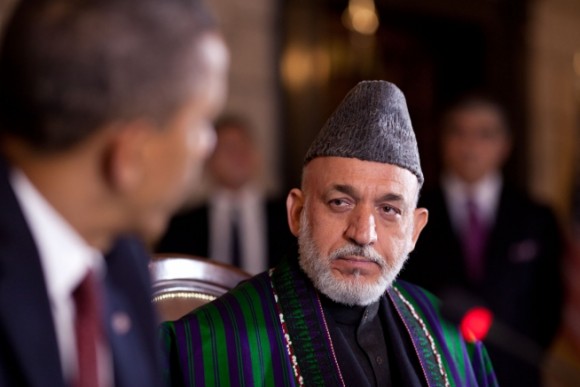
Afghan President Hamid Karzai is being depicted in the media as an obstinate spoiler who is sabotaging America’s plans for a decade or more of continued U.S. military occupation of Afghanistan by refusing to sign a status of forces agreement (SOFA) governing future troop presence. Who knows, maybe he is an obstinate saboteur. But his stated reasons for thwarting a security deal in the lead up to the scheduled 2014 drawdown are substantive.
I’ve written before about how ironic it is that the sticking point on a SOFA is whether U.S. troops will be granted legal immunity from Afghan law, since it kind of implies expectations on both sides that U.S. soldiers will continue to commit crimes. And yes, the security deal does hinge on this question of legal jurisdiction, but there is a more literal reason to stall the agreement.
This ably reported piece in the Los Angeles Times puts Karzai’s reluctance to sign a deal in the context of continued civilian casualties caused by U.S. troops. A September drone strike, the article explains, killed 14 people who residents say were civilians and U.S. officials say were Taliban.
“There were pieces of my family all over the road,” said Jan, recalling the deadly Sept. 7 late afternoon incident in an interview last week. “I picked up those pieces from the road and from the truck and wrapped them in a sheet to bury them.
“Do the American people want to spend their money this way, on drones that kill our women and children?” he asked.
The repercussions of such strikes are felt far beyond the dark escarpments of Kunar province. The grief and rage of Jan and his relatives help explain the approval among some Afghans of President Hamid Karzai’s thus far non-negotiable demand that civilian casualties cease if he is to sign a proposed 10-year security agreement with the United States.
Karzai responded to the Kunar attack by accusing the United States of recklessness and callous disregard for innocent Afghans. After a child died in a drone strike Thursday in southern Afghanistan, Karzai suggested that the attack had ended any chance of an accord.
Civilian deaths at the hands of U.S. forces have long poisoned Karzai’s relationship with the United States. That antagonism has hardened this month into a vise that could abruptly end America’s 12-year, multibillion-dollar investment in Afghanistan, despite a decline in civilian casualties due to new safeguards by foreign forces.
Under current agreements, U.S. forces operate under the legal jurisdiction of the U.S. military, which makes it next to impossible for Afghans to seek recourse for operations that scatter their family’s body parts all over the road. And as the last decade of occupation has indisputably demonstrated, the U.S. typically has a rather blasé attitude about investigating and prosecuting crimes committed by American soldiers.
This has led the Obama administration to, once again, threaten a “zero option,” in which all U.S. troops are pulled out in 2014 as they were in Iraq in 2011. The administration quite clearly wants to avoid this, but they aren’t about to leave U.S. troops to the Afghan legal system. So, the zero option is a real possibility – a good thing for everyone, including Afghan civilians.
“The possibility of a military presence into 2024 is unacceptable,” says Representative Barbara Lee (D-CA). “There is no military solution in Afghanistan. After 13 years and more than $778 billion invested in an unstable country and the corrupt Karzai government, it’s time to bring our troops and tax dollars home.”



